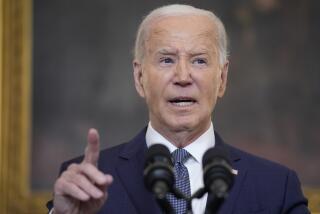Reagan Offers New Contra Aid Compromise
WASHINGTON â In an 11th-hour attempt to sway wavering members of the House of Representatives, President Reagan promised Tuesday night that he will withhold military funding for the Nicaraguan Contras if Congress tells him this spring that the Sandinista government is complying with the regional Central American peace agreement.
The pledge, made by Reagan in a televised address from the Oval Office, represented a last-ditch effort by the Administration to head off expected defeat of Reaganâs aid package for the rebels in a House vote today.
Inadequate, Democrats Say
However, Democratic opponents rejected the offer as inadequate. They said that as long as Reaganâs $36.25-million aid package provides for any weapons for the rebels, their slim margin to defeat it will hold up.
The President, in a speech that the three major networks declined to broadcast, mixed an impassioned appeal for the Contrasâ needs with one of his harshest denunciations of the Sandinista government, declaring that none of its promises of democratic reforms can be trusted.
âThere can be no mistake about this vote: It is up or down for Central America. It is win or lose for peace and freedom. It is yes or no to Americaâs national security.â
âNo Second Chancesâ
âThere will be no second chances tomorrow,â the President said in an address telecast by Cable News Network and the Public Broadcasting System. âIf Congress votes down aid, the freedom fighters may soon be gone, and with them, all effective pressure on the Sandinistas.â
The Democrats, countering with a strongly worded speech of their own, declared that subsidizing the Contras would only undermine the Central American peace process and prompt the Soviets to send more aid to the Sandinistas.
The United States has important security interests in Central America, said Rep. Lee H. Hamilton (D-Ind.) in a televised statement, but âthe Contras do not and cannot protect them.â
Democratic leaders said they plan to propose their own plan for the Contras in the next few weeks.
The Presidentâs proposal calls for about $32 million for non-lethal supplies, such as food, clothing and transportation equipment, and $3.6 million for arms, ammunition and Redeye anti-aircraft missiles.
Under the offer he unveiled Tuesday night, the weapons aid would be suspended until March 31 to determine whether the Sandinistas are carrying out commitments to democratic reforms and to assess progress toward a cease-fire with the rebels.
If Congress passes a âsense of Congressâ resolution within 10 days of that deadline affirming that the Sandinistas are making adequate efforts, he said, he would âwithhold deliveries of ammunition in this package.â
The peace agreement reached last August by Nicaragua, Costa Rica, El Salvador, Guatemala and Honduras calls for a regional cease-fire, increased civil liberties and an end to outside support for guerrilla operations.
Last-Minute Plan
A senior White House official, speaking on condition of anonymity, said that the proposal was drafted by aides and presented to Reagan late in the day as the White House was âlooking for ways to round up those sitting on the fence.â
Democratic opponents are believed to have a margin of fewer than 10 votes to defeat the plan.
California Rep. Tony Coelho (D-Merced), the Democratsâ chief vote counter, dismissed Reaganâs offer as âtoo little, too late. It misses the point and it wonât save his package. It wonât change a single vote.â
Congressional opponents also charged that Reaganâs offer to bring Congress into the decision of releasing military funds is a ruse. Under the current ground rules agreed to by the White House, they said, the Presidentâs aid package will be automatically dead if only one house of Congress votes against it. Under Reaganâs new offer, both houses of Congress would have to approve a resolution opposing further aid to halt new military assistance.
U.S. Warns Contras
Earlier in the day, the State Department, reflecting pessimism about the outcome, warned Contra leaders in Miami that the outlook is âbleak,â one Administration official said.
Further, officials put a planned Central America trip by Secretary of State George P. Shultz on the back burner.
In his speech, Reagan said that the national security repercussions of a congressional rejection of Contra aid will be severe.
âWith Cuban and Soviet Bloc aid, Nicaragua is being transformed into a beachhead for aggression against the United States--it is the first step in a strategy to dominate the entire region of Central America and threaten Mexico and the Panama Canal.
âThat is why the safety of democracy to our south so directly affects the safety of our own nation,â he said, equating the Contras to the French Resistance in World War II.
Referring to opponents who seek non-lethal, or so-called humanitarian aid without the military component, the President declared: âThereâs nothing humanitarian about asking people to go up against Soviet helicopter gunships with nothing more than boots and bandages.â
âNot What Is Neededâ
Hamilton, in the Democratic rebuttal, said that giving the Contras more weapons âis not what is needed to achieve peaceâ in the region.
But Hamiltonâs speech also reflected concerns that Democrats would be perceived âsimply as the party that defeated Contra aidâ and as soft on communism, said Coelho, the majority whip.
The promise of an alternative plan has become a key bargaining chip for the Democrats in their lobbying of undecided House votes. But sponsors have offered only sketchy details, in part because moderates and liberals disagree over whether non-military aid should be offered to the Contras or whether only payments for resettlement in another country will be allowed.
In a written statement, White House Chief of Staff Howard H. Baker Jr. criticized the major networksâ decision not to broadcast the Presidentâs speech, charging that they were substituting âtheir judgment for that of the President on what the country should have the opportunity to hear.â
The last time ABC, CBS and NBC rebuffed a Reagan speech was in June, 1986, when the topic was also Contra aid. Network officials said that Reaganâs appeal Tuesday did not merit live coverage.
Times staff writers Jim Mann and Doyle McManus contributed to this story.
More to Read
Sign up for Essential California
The most important California stories and recommendations in your inbox every morning.
You may occasionally receive promotional content from the Los Angeles Times.










